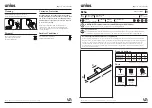
Chapter 7
RAPID!
RAPID! syntax
274
4460 GSM System Option and 4468 EDGE System Option
Version 12.20
Numeric expressions
numExp := [signOp] numVar | numConst | numFct |
boolExp | numExp [ operator numExp ]
Where
–
signOp
is the sign operator (+ or –),
–
numVar
is a numeric variable,
–
numConst
is a numeric constant,
–
numFct
is a BASIC function that returns a numeric result,
–
boolExp
is a boolean expression, as explained below
Example:
( LEN (AString$) – 2) * 5
This is a numeric expression that contains
– a numeric variable (
OneVar
),
– a function (
LEN
) of a string variable (
AString$
),
– the ope, – and *
– and two numeric constants (
2
and
5
).
The result of this expression will be a numeric value.
String expressions
stringExp := stringVar | stringConst | stringFct { +
stringVar | stringConst | stringFct }
Where
–
stringVar
is a string variable,
–
stringConst
is a string constant,
–
stringFct
is a BASIC function that returns a string as the result.
Note:
A string expression always delivers a string.
Example:
FirstName$ + " " + LastName$
is a string expression. It delivers
back a string that contains the two string variables
FirstName$
and
LastName
$, separated by a blank.
Boolean expressions
Boolean expressions are more complex than the preceding ones:
boolExp := boolOperation | comparison | boolFct
Where
– boolOperation := NOT boolExp | boolExp AND | OR |
XOR boolExp
– comparison := stringExp compOperator stringExp |
numExp compOperator numExp
NOTE
A numeric expression always delivers a numeric result.
















































